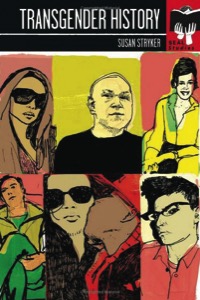
Sandy Stone is a touchstone woman in transgender history. She has a section dedicated to her place in trans and feminist history in the book Transgender History.
This is the final piece, excerpted from that interview, beginning with her answer to the question, “So what’s it like being a professor?”
Sandy Stone: I had a very intense history with a dear, dear friend – at that time a young woman who was 17 when we met – fell madly in love, had a tumultuous affair that lasted 20 years – 20 years lost from my life. When we met the second time she was a professor of sociology. “What the hell are you doing as a professor of sociology? C’mon!” And she took me by the shoulders and she said, “Sandy, look at your life. You have no future. You have no intellectual community. Why not? Because you’re not looking for where the intellectual community is. And you know what else is going to happen? You’re going to end up with no health insurance, no social safety net. You’ve got to get into the university! You’ll find all of those things waiting for you there!”
And, I ignored her.
And, damned if she didn’t turn out to be right, but it took me maybe another 10 years to figure out she was right.
I intend to die teaching up here [at UC Santa Cruz]. I’m home now.
Autumn Sandeen: Trans people seem to be coming out younger and younger.
You mean like 3?
Yeah. The standard narrative a dozen years ago used to be mid-life transitioners. In the last few years we were discussing primary and secondary school transitioners, AB 1266 — what bathrooms they were going to use. As we’re becoming a younger community, what do you think this means for us?
For one thing I think it’s going to confuse a lot of gender critical feminists who believe gender is a performance. There’s something going on here that’s beyond gender as a guise or disguise or a social position. We don’t know what the hell it is. I’m still active in the medical field and I have no fracking idea what it is. And, I don’t know anyone who does, but we acknowledge that it’s real.
And, I think that trend will continue – and with [hormone] blockers. We’re getting to whole new places where it was impossible to go before.
I don’t know what will happen in 15 or 20 years. But what I think will happen is more and more people will transition as young as they want to. That will become more accepted.
I’m sure you’ve heard of the Personal Privacy Act Initiative. Due to how California’s initiative process works, this likely will be on the ballot in November 2016.
It’s a “bathroom bill.”
It’s going to be state buildings, and if it passes it’ll impact UC Santa Cruz.
It’ll be a fight; it’ll be a fight I think we’ll win. We might not win next time because they’ll keep coming back. But, the lunatic fringe has a way of getting smaller. If we can withstand it for another 10 years I think we’ll have the edge.
In 1986 Bayard Rustin said gays were at the center of the “we/they distinction” because things people wouldn’t feel comfortable saying about other minority populations they were comfortable believing and saying about gays. Most people didn’t know any gay people. I think in 2015 trans people are now at that center point for the same reasons. How do you feel about that idea?
Many years ago a friend of mine found himself in – I think it was Germany – they had one of the Nazi war criminals there, and my friend who was Jewish had the opportunity to interview this guy. The war criminal was courteous, kind and polite, articulate, well-spoken and intelligent; they had a very nice conversation.
His friend who had introduced him to the war criminal said, “You realize he only considers you as an animal?” That brought back the reality of the situation. The prisoner did in fact consider my Jewish friend an animal – something lower than human.
To me it’s like that talking to one of the anti-bathroom people. You can have courteous conversations with them, but if you scratch their surface, they are beyond any evil I can speak.












Thank you so much for both parts of this interview with Sandy Stone, a truly iconic Second Wave feminist.
One thing I’ve learned is that, sadly, there are still people ready to justify the attacks on the Olivia collective during 1976-1978. Such conversations can be sobering.
What I pick up is a kind of prejudice maybe a bit like what was called limpieza de sangre or “purity of blood” in 15th-16th century Spain. Even if you were a good Catholic, if any of your ancestors was a Jew or Muslim, then you lacked this “purity,” and would be discriminated against accordingly. The limpieza concept is said to be one of the origins of modern European racism.